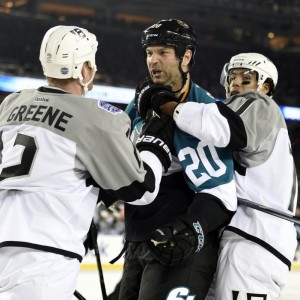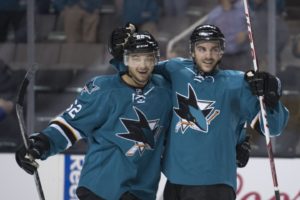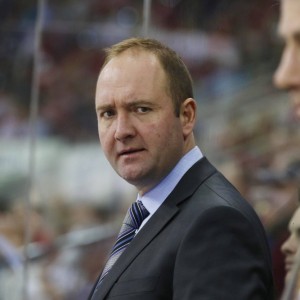The San Jose Sharks have done something over the years which has divided many of their most passionate fans. They have played their enforcers – the guys who throw the punches – to the delight of some fans and the frustration of others.
While fighting is a part of the NHL, many wish to reduce or eliminate it. There are long-term issues with blows to the head. Trying to reduce these blows is a noble cause. Fighting is clearly part of this equation.
However, putting an end to fighting is not supported by the primary beneficiaries, the players themselves. Despite all the evidence which has come out about the long-term effects of head trauma, players see fighting as an essential part of the game. Recently, ESPN asked 13 players, none fighters, about the role of fighting in the game. Not one player expected its demise. Perhaps more importantly, not one saw a need for its demise — indeed, most felt it was a part of the game and here to stay.
In This Corner

The Sharks primary pugilist is Micheal Haley. He has taken on the role following recent stints by former Sharks Mike Brown and, most famously, John Scott.
As a hockey player, Haley is modestly skilled. Coming into this season, he had just four points in his career with 72 games played — not much for a player who is 30. This season has been a step forward. He has put up nine points in 42 games — not bad for a fourth line player. Haley is also a positive player (plus-5).
Worth noting, the Sharks record with him in the lineup is similar to their record without him in the lineup. Haley averages nearly two minutes of penalty time per game, most of it served concurrently with the player he just fought. Even so, he manages nine minutes of ice time per night. Again, a respectable amount for a fourth line player who spends a substantial amount of time in the penalty box.
Help or Hindrance?
The Sharks will make the playoffs. There would be deserved criticism of Haley and the coaches if he somehow hindered the Sharks chances at making the playoffs. That has not happened.

Haley is not hurting the team. But is he helping? The most likely answer is yes. The Sharks have had six players make their NHL debut this season. Younger players are the ones most likely to face intimidation from bigger, stronger veterans. Having a teammate who will fight on behalf of these younger players provides them added confidence. This sort of “protection” has a long history in the NHL. Even veterans are protected, though with less frequency.
About the Back
Last season, the Edmonton Oiler’s Darnell Nurse jumped the Sharks Roman Polak, bloodying the big defenseman and breaking his nose. In the next game between the two teams, head coach Peter DeBoer inserted Haley into the lineup to fight Nurse. There was no question how the Sharks players felt with this move. The coach had the players back, Haley had his teammate’s back.
http://gty.im/624623066
Having each other’s back is a key element of being an effective sports team. Having someone else’s back also matters in close relationships, in the military, in legal battles, in a job or fighting an illness. It is an important part of life.
Haley represents this element. He is the player whose presence in the lineup says “the coach has my back.” He is the player whose presence on the roster says “management has my back.” For younger players and even veterans, knowing Haley is there to fight the battles strengthens the bond among players. And it strengthens the bond between players and the organization. There is a reason fighters are often very well liked by their teammates.
The Limitations

Alas, the help Haley provides has its limits. Come the playoffs, there is plenty of nasty, but it is much less likely to end up with a fight. As such, the role for Haley, and those around the league like him, gets diminished. Teams will skate their best hockey players.
For the Sharks, Haley is not one of the 12 best forwards, so he will likely watch the postseason. Injuries to other forwards could put Haley into the lineup. The other possibility for him to see action is if a series seems to be getting out of control. But realistically, his season ends at game 82. For the younger players, their time with the protective force Haley provides also ends with the completion of the regular season.
About Going Forward
For what the Sharks need now and for another month, Haley is effective. He has not hurt the Sharks ability to win games. The team will make the playoffs. He has offered confidence for younger players to skate without fear of having to punch their way into the league. This gives these players a better chance to develop their game. Plus Haley helps the team’s morale. Coaches and management tell players “we’ve got your back”. Haley’s presence is a case of actions speaking louder than words.
Whatever one thinks about fighting in the game, it is a reality today. For the Sharks, Micheal Haley is handling this role effectively.
Zeke’s Notes
• The need for an enforcer in the playoffs is rare these days, but not unheard of. One such series came back in 2011 when Chicago coach Joel Quenneville inserted John Scott to calm down Vancouver’s choirboy line of Raffi Torres, Maxim LaPierre and Tanner Glass. In the series, the Blackhawks won three of the four games Scott played in. And lost all three he didn’t.

I’m not sure any team in the Western Conference has this sort of line. In the Eastern Conference, however, Montreal has assembled a roster which includes Steve Ott, Dwight King and Andrew Shaw. New coach Claude Julien does not have a problem with the edgy players. In Boston, Julien had very chippy players like Milan Lucic and Brad Marchand. It will be interesting to see how Montreal’s playoff opponents address this.
• Marcus Sorensen scored his first NHL goal against Vancouver on Thursday. Sorenson is the ninth Sharks AHL call-up this season and the sixth to make his NHL debut. Perhaps surprisingly, none of the recent first round picks are making a splash.
Nikolay Goldobin (traded to Vancouver at the deadline), Mirco Mueller and Timo Meier have not stuck with the parent club. But Kevin Labanc, a sixth-round pick, has. He has produced 19 points and a plus-9 rating. Ryan Carpenter and Sorenson, both undrafted, have made strong cases for themselves in limited appearances. In their combined 15 games, they have three goals, three assists and are plus-7.
• For those in attendance at the Vancouver game (or perhaps viewing from home), some may have noticed many people wearing turbans in the venue — it was a promotion, Sikh Heritage Night. At a small booth near the entrance, members of a local Sikh group offered people the chance to wear a turban. This promotion has been done before in other sports leagues, it seems the Sharks are the first NHL team to do this.